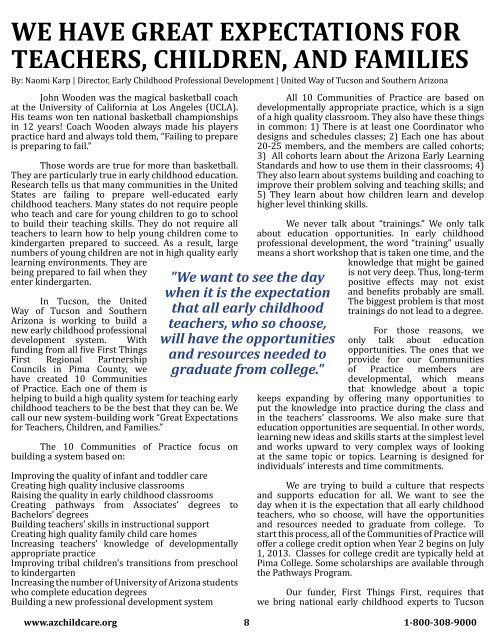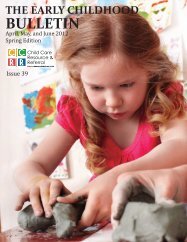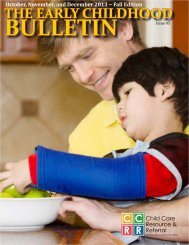pIma COUNTY - Child & Family Resources
pIma COUNTY - Child & Family Resources
pIma COUNTY - Child & Family Resources
Create successful ePaper yourself
Turn your PDF publications into a flip-book with our unique Google optimized e-Paper software.
WE HAVE GREAT EXPECTATIONS FOR<br />
TEACHERS, CHILDREN, AND FAMILIES<br />
By: Naomi Karp | Director, Early <strong>Child</strong>hood Professional Development | United Way of Tucson and Southern Arizona<br />
John Wooden was the magical basketball coach<br />
at the University of California at Los Angeles (UCLA).<br />
His teams won ten national basketball championships<br />
in 12 years! Coach Wooden always made his players<br />
practice hard and always told them, “Failing to prepare<br />
is preparing to fail.”<br />
Those words are true for more than basketball.<br />
They are particularly true in early childhood education.<br />
Research tells us that many communities in the United<br />
States are failing to prepare well-educated early<br />
childhood teachers. Many states do not require people<br />
who teach and care for young children to go to school<br />
to build their teaching skills. They do not require all<br />
teachers to learn how to help young children come to<br />
kindergarten prepared to succeed. As a result, large<br />
numbers of young children are not in high quality early<br />
learning environments. They are<br />
being prepared to fail when they<br />
enter kindergarten.<br />
In Tucson, the United<br />
Way of Tucson and Southern<br />
Arizona is working to build a<br />
new early childhood professional<br />
development system. With<br />
funding from all five First Things<br />
First Regional Partnership<br />
Councils in Pima County, we<br />
have created 10 Communities<br />
of Practice. Each one of them is<br />
helping to build a high quality system for teaching early<br />
childhood teachers to be the best that they can be. We<br />
call our new system-building work “Great Expectations<br />
for Teachers, <strong>Child</strong>ren, and Families.”<br />
The 10 Communities of Practice focus on<br />
building a system based on:<br />
Improving the quality of infant and toddler care<br />
Creating high quality inclusive classrooms<br />
Raising the quality in early childhood classrooms<br />
Creating pathways from Associates’ degrees to<br />
Bachelors’ degrees<br />
Building teachers’ skills in instructional support<br />
Creating high quality family child care homes<br />
Increasing teachers’ knowledge of developmentally<br />
appropriate practice<br />
Improving tribal children’s transitions from preschool<br />
to kindergarten<br />
Increasing the number of University of Arizona students<br />
who complete education degrees<br />
Building a new professional development system<br />
"We want to see the day<br />
when it is the expectation<br />
that all early childhood<br />
teachers, who so choose,<br />
will have the opportunities<br />
and resources needed to<br />
graduate from college."<br />
All 10 Communities of Practice are based on<br />
developmentally appropriate practice, which is a sign<br />
of a high quality classroom. They also have these things<br />
in common: 1) There is at least one Coordinator who<br />
designs and schedules classes; 2) Each one has about<br />
20-25 members, and the members are called cohorts;<br />
3) All cohorts learn about the Arizona Early Learning<br />
Standards and how to use them in their classrooms; 4)<br />
They also learn about systems building and coaching to<br />
improve their problem solving and teaching skills; and<br />
5) They learn about how children learn and develop<br />
higher level thinking skills.<br />
We never talk about “trainings.” We only talk<br />
about education opportunities. In early childhood<br />
professional development, the word “training” usually<br />
means a short workshop that is taken one time, and the<br />
knowledge that might be gained<br />
is not very deep. Thus, long-term<br />
positive effects may not exist<br />
and benefits probably are small.<br />
The biggest problem is that most<br />
trainings do not lead to a degree.<br />
For those reasons, we<br />
only talk about education<br />
opportunities. The ones that we<br />
provide for our Communities<br />
of Practice members are<br />
developmental, which means<br />
that knowledge about a topic<br />
keeps expanding by offering many opportunities to<br />
put the knowledge into practice during the class and<br />
in the teachers’ classrooms. We also make sure that<br />
education opportunities are sequential. In other words,<br />
learning new ideas and skills starts at the simplest level<br />
and works upward to very complex ways of looking<br />
at the same topic or topics. Learning is designed for<br />
individuals’ interests and time commitments.<br />
We are trying to build a culture that respects<br />
and supports education for all. We want to see the<br />
day when it is the expectation that all early childhood<br />
teachers, who so choose, will have the opportunities<br />
and resources needed to graduate from college. To<br />
start this process, all of the Communities of Practice will<br />
offer a college credit option when Year 2 begins on July<br />
1, 2013. Classes for college credit are typically held at<br />
Pima College. Some scholarships are available through<br />
the Pathways Program.<br />
Our funder, First Things First, requires that<br />
we bring national early childhood experts to Tucson<br />
www.azchildcare.org 8 1-800-308-9000





